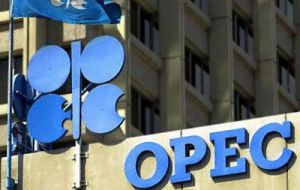MercoPress. South Atlantic News Agency
Release of strategic reserves (to counter Libya’s absence) rattles world oil market
 The measure is also seen as a reply to OPEC’s refusal to increase output
The measure is also seen as a reply to OPEC’s refusal to increase output Oil rose in New York, recovering from a plunge sparked by an International Energy Agency announcement that its members will release crude from strategic reserves.
Oil for August delivery climbed as much as 1.5% to $92.34 a barrel in electronic trading on the New York Mercantile Exchange. Crude on Wednesday slid 4.6% to $91.02 a barrel, the lowest settlement since Feb. 18.
The IEA announced the release of 2 million barrels a day for 30 days beginning next week to help make up for a Libyan supply disruption.
Brent oil for August delivery on Wednesday fell $6.95, or 6.1%, to $107.26 a barrel on the London-based ICE Futures Europe exchange, the lowest price since Feb. 22.
Half of the 60 million barrels of crude from the IEA release will come from the US Strategic Petroleum Reserve, according to the IEA and the US Energy Department.
The announcement from IEA, a group of more than two dozen countries, covers only what the world uses roughly every 16 hours. But it was enough to cool oil prices.
In addition to helping the struggling economies of the U.S. and Europe, analysts said the move was meant as a rebuke to OPEC, which has refused to increase oil production to bring down prices.
It will be the largest sale of crude ever from world strategic reserves and only the third since the IEA was formed in 1974 after the Arab oil embargo. The IEA released oil in 2005 after Hurricane Katrina and in 1990 and 1991 after Iraq invaded Kuwait.
The IEA said high oil demand and shortfalls of oil production caused by unrest in the Middle East and North Africa threatened to “undermine the fragile global economic recovery.”
The uprising in Libya has taken 1.5 million barrels of oil per day off of the market, half a million barrels less than will be released each day by the IEA.




Top Comments
Disclaimer & comment rules-

-

-

Read all commentsThis is the battle ground of the Sunni - Shia war for dominance of the Middle East.
Jun 24th, 2011 - 10:32 pm 0Venezuela etc are the blind bloody infantry in a war of dominance between Iran and Saudi Arabia.
OPEC is dead.
Jun 25th, 2011 - 03:39 am 0No, obviously not so, but the OPEC voting - which includes The Organization of Arab Petroleum Exporting Countries or OAPEC - and which now splits consistently against Arab oil, recognises that the political power of oil control is not in the same place as most of the oil.
Jun 25th, 2011 - 12:06 pm 0This will need addressing - and not just by the Arabs.
Also, a seat will have to be found at the table for Brasil at some time, once pre-salt reserves come fully on stream.
Commenting for this story is now closed.
If you have a Facebook account, become a fan and comment on our Facebook Page!